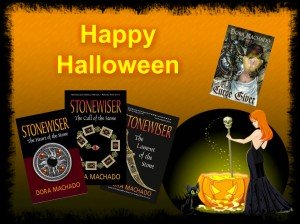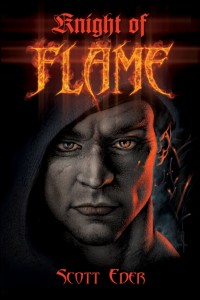It’s a Curse Giver kind of day

Have a fun and safe Halloween.
D.

As many of you know, I’m a sucker for a great romance. My guest today is Aaron Paul Lazar, who is celebrating the release of his heart-warming romance, The Seacrest. The Seacrest has been compared to Nicholas Spark’s evoking novels. Warren Adler, bestselling author of The War of the Roses and Random Hearts, says that “The abiding power of a first love resonates throughout this compelling story of loss and redemption.” I can’t wait to read The Seacrest! Scroll to the bottom for a peek at this powerful story and help us drive it up to the top of Amazon’s charts by buying it today at http://amzn.to/16pjh4i.
And now, some very wise words of wisdom for new writers everywhere.
Enjoy!
D.
Quit Your Job?
Maybe not just yet.
Words of Wisdom for New Writers
By
Aaron Paul Lazar
(Who really, really knows what he’s talking about!)

The stages through which writers suffer in their careers are unique compared to most professions. Yet, strangely enough, these experiences can be startlingly similar from one writer to the next.
I’m reminded of this as yet another talented new writer has “found” me through the Internet and turned to me for advice. We’ve been exchanging regular email, and have covered questions from copyright to agents to query letters and beyond. I believe in helping writers whenever possible, and always try to make time for them when I can.
Why?
Because that’s what S.W. Vaughn, R.C. Burdick, Mary Emmons, and other generous folks did for me when I was just starting out.
I remember it so clearly. The angst-riddled beginning: when I’d just turned out my first novel and imagined it on the best seller’s list. I secretly hoped it would be snapped up in a few weeks, but feared at the same time how deluded I probably was, and feared I would be outed by the critics as a poor untalented slob who would never get into that elite club of “real writers.” Even though my family and friends said they loved my books… they had to say that? Right?
Time passes. More books are written. Agents get interested. Skills improve. And among the piles of rejections and torn hair and crumpled rewritten query letters, books eventually get sold. Maybe not to the big boys in the top five companies with all the promotional money, maybe not through agents who finagle six figure deals, but stuff happens and one’s readership expands.
People write to you from out of the blue. Regular people. Lovely people. People you befriend and learn from and cherish. People who say they’ve changed the way they read to their children because of your book, or who tell you they read to their dying mother and that your book comforted her. Those moments are supremely satisfying. And humbling. And so precious.
The first review comes in from a high profile literary critic. This one comes out of the woodwork, without solicitation. And he praises your work like you’ve never dared imagine. He GETS you. He really GETS you. And for the first time in your career, you feel totally validated. I’ll never forget that first time. His name was Thomas Fortenberry, and I remember the email, word for word. I opened it early on a dark Sunday morning–before dawn–and I lay in bed with the laptop humming with tears of joy on my cheeks.
It floats you to the moon, and validates you, and keeps you going. Until, of course, someone dares criticize your work. Of course, eventually it will happen, whether it’s a minor critique or a full blown trashing. You can’t make adoring fans out of everyone!
But thankfully, the really bad review ends up being written by someone with a humongous grudge on your first publisher. Someone who makes it his first order of business to drag down authors from that company. So, the sting lessens. A little.
The first book signing comes and goes. Becomes a frequent event. Book clubs contact you–and you get to meet gangs of your adoring fans. It feels good. Really good.
Maybe it’s a sign that you don’t really stink as bad as you fear? (see, that angst still hangs around for years and years.)
Libraries contact you for event after event. And suddenly–here you are, having to turn down events you only dreamed of as a novice.
It’s rather strange, and equally wonderful. And so the story continues.
Coming fresh from dispensing advice to my new friend, I’ve jotted down a few thoughts to share. Words of wisdom, I guess you could say, or at least philosophies that seem to work for me. Here they are, in no particular order:
1) Keep writing, independent of which agent or publisher you have in your sights or in hand. Write as many books as you possibly can, and grow your skills as you grow your stable of books.
2) Improve your current proficiency–continually–by befriending a few good critique partners and by reading as much as you possibly can. Great writers will be your best teachers.
3) Don’t quit the day job unless you have the luxury of doing so financially. Plan to work indefinitely until you’ve sold over 100,000 copies of your first book. Really. I’m serious. (which means most of us will keep the day jobs forever) Then, wait to see if your second book flops or follows the trend of the first. There are plenty of one hit wonders out there! After two “A” movies have been made (I’m picturing about a half a million for each), then you can consider quitting the day job. That is, if you’re good with money and feel as if you can keep churning out books for a very long time. Remember, if you’re–say fifty years old–you might need to support yourself (and maybe your spouse) for another fifty years. You’d need several million to keep yourself going at a reasonable income level for that long. So don’t quit the day job yet!
4) While you’re waiting for this elusive financial success, and you’re writing book after book, submit your manuscript and queries to all levels of publishers, but only to the top agents in NYC. (my humble opinion) Consider a small high quality press to get started, especially if the big publishers haven’t snapped you up in the first year, or five.
5) Don’t define your success as a writer by how many books you sell or how fast your novel(s) get picked up. Or even IF they get picked up. Define your success by the readers you win over, whose lives you may even change as a result of your writing. Cherish their comments, and realize that if you can make one person smile, or brighten their day, or give them an armchair adventure that whisks them away from their troubles – then THAT may be worth it, and all you need to be validated.
6) Although it takes time away from your writing, build a strong, genuine network of writers with whom you can share, grow, learn, gripe, vent, and just share the common angst and jubilation that comes with this long process. Do the same with your readers who fall in love with your book(s) and are willing to help you along the way.
7) Start on the next book before the first is accepted anywhere. Don’t look back. Keep going and follow your heart.
8) You must believe it “will” happen. It’s just a matter of time. Although my books provide a nice subsidy at this point in my career, I firmly believe that some day my books will sell enough copies through my high quality small press (Twilight Times Books) to catch the attention of a movie maker or giant publisher with deep pockets. And now, with my new love story just released, I’m picturing the film for The Seacrest in full living color. ;o) And I know, I believe, I see in the future–eventually–that both of my series will some day be commonly found across the globe. Maybe it’ll be when I’m dead and gone, and perhaps my grandkids or great grandkids will benefit. That would be just fine with me!
About Aaron Paul Lazar
Aaron Paul Lazar writes to soothe his soul. An award-winning, bestselling Kindle author of three addictive mystery series, writing books, and a new love story, Aaron enjoys the Genesee Valley countryside in upstate New York, where his characters embrace life, play with their dogs and grandkids, grow sumptuous gardens, and chase bad guys. Visit his website at http://www.lazarbooks.com and watch for his upcoming releases THE SEACREST (2013), SANCTUARY (2014), and VIRTUOSO (2014).
ONLINE LINKS:
All About The Seacrest:
They say it’s better to have loved and lost than never to have loved at all.
Finn McGraw disagrees.
He was just seventeen when he had a torrid summer affair with the girl who stole his heart—and then inexplicably turned on him. Finn may have moved on with his life, but he’s never forgotten her.
Now, ten years later, he’s got more than his lost love to worry about. A horrific accident turns his life upside down, resurrecting the ghosts of his long-dead family and taking the lives of the few people he has left.
Finn always believed his estranged brother was responsible for the fire that killed their family—but an unexpected inheritance with a mystery attached throws everything he knows into doubt.
And on top of that, the beguiling daughter of his wealthy employer has secrets of her own. But the closer he gets, the harder she pushes him away.
The Seacrest is a story of intrigue and betrayal, of secrets and second chances—and above all, of a love that never dies.
****
Want to know more? How about a sneak peek at the first chapter? http://www.lazarbooks.com/theseacrest.htm
“The Seacrest is a poignant love story that will have you reaching for the tissues. Every woman needs a Finn McGraw!” – Victoria Howard, bestselling romantic suspense author of RING OF LIES.
“At a time when many authors seem to crank out fiction by the numbers, Aaron Paul Lazar invests his whole heart in every book he writes. His stories shine with sensitivity, compassion, and the richness of deeply personal experience.” – Michael Prescott, bestselling thriller author of GRAVE OF ANGELS
“…Beautifully drawn, The Seacrest explores twin mysteries of past and present tragedies that combine into a fascinating tale in which a young couple overcomes life’s misunderstandings, while reaching for the truth.” – Sheila Deeth, author of Divide by Zero
Help us drive THE SEACREST to Amazon’s top rankings by purchasing it today, Monday, October 28th at http://amzn.to/16pjh4i.
Hello everybody!
I love to listen to a good story. I find it comforting, relaxing and fun to hide in a quiet corner, plug in my headset, and bask in the wonders of a great tale. My love affair with audio-books probably began early on as a child, when my parents shared their love for books by reading aloud to me. I remember thinking that it was such a treat! I then read to my own children and learned to relish not only the great children’s books of a new generation, but especially, our time together. Reading aloud to our children is not just fun; it’s also a loving gift and a lasting legacy. Look at me. I’m still craving the story that the voice tells. Or is it the voice that tells the story?
Audiobookjungle.com is one of only a handful of sites dedicated exclusively to audio-books. As a disclaimer, I will say that I don’t know the principals and only discovered it by accident, when my publicist submitted Stonewiser: The Heart of the Stone for review. It is a treasure find, packed with helpful reviews, discussions, articles and tips for audio-book addicts. So if like me, you love to listen to your books as you commute to work, wash the dishes or before you turn in for the night, don’t miss http://audiobookjungle.com.
As luck would have it, audiobookjungle.com did review the first novel of the Stonewiser series and, to my utter delight, found it worthwhile. So here it is, audibookjungle.com’s brand new review of Stonewiser: The Heart of the Stone, audio-book edition.
Enjoy!
D.
Who is the author
Dora Machado, the author of the Stonewiser trilogy is relatively new to the fantasy scene, at least that’s what I gathered from looking her up online. At the time of posting this review she has written four fantasy novels which seem to be well received from the readers. The first book in the Stonewiser trilogy, Stonewiser: The Heart of the Stone is the one I read and I’ll certainly be grabbing the next one as soon as possible. It’s really good. No wonder it won the 2009 Benjamin Franklin award for best debut novel.
What does stonewiser mean
The title sounds a little mysterious because the word stonewiser is fictional and you don’t know what to expect until you start reading. I’m usually the type of person who would do minimal or no research regarding a book I’m about to read, as I don’t want to see any spoilers or get my judgment of it’s quality swayed. The problem is that if you do that with authors new to you it takes awhile to get used to their style and get a feel of what the book is going to be about. Dora Machado throws you straight into the action from the first chapter. You immediately learn that stonewisers are gifted people that can imprint stones with information and read it. You also learn that there are some kinds of stones that are not supposed to be wised because The Guild forbids it. That’s good writing right there – you get the essentials right away but you want to know more, right now! ![]()
What’s the premise of the story?
Find out more at http://audiobookjungle.com/
What I liked
The writing. It’s well crafted, easy to follow and engaging. While the basic skeleton of the story isn’t groundbreaking (a rebellious heroine that kicks ass and changes the world) it has fresh and intriguing bits. I appreciated the occasional dark and gritty scene that surprises you with it’s violence without becoming uncomfortable to read. The characters were vivid and interesting and here’s where the narrator should also get a portion of the credit. Melissa Reizian Frank does an excellent job. I also appreciated that the audiobook didn’t end with a cliffhanger and the ending provided enough closure to even look at The Heart of the Stone as a stand-alone novel. That doesn’t happen a lot these days, especially with fantasy novels.
What I didn’t like
This may seem a little nit-picky but it bothered me noticeably and it’s something I think an editor should have noticed. The use of ‘Meliahs, help/save us’ as an exclamation (Meliahs is the goddess of the sacred stones) was overdone and appeared too often in scenes where the characters were distressed in some way.
Final thoughts
If you’re looking for a fresh and well written fantasy audiobook, Stonewiser: The Heart of the Stone is an excellent pick. I hope it gets as much of a following and readers as it deserves.
A Quick Guide to The Stonewiser Series
Get your copy on Audible:
I’m delighted to introduce my friend and Twilight Times Books fellow author, Scott Eder, whose first contemporary fantasy novel, Knight of Flame, was just released to great praise and excellent reviews. In his blog today, Scott shares his search for an irresistible first chapter. So it’s only fitting that we should begin with a gift from this talented author, the first five chapters of Knight of Flames, free, right here, at your fingertips:
http://www.twilighttimesbooks.com/KnightofFlame_ch1.html
Enjoy!
D.
***
The Power of Repetition
By
Scott Eder
I’m always looking for ways to take my writing to the next level. Classes, books, podcasts, conversations… the list goes on. As a perpetual student, I’m learning and practicing every single day. But some lessons are tougher than others and require multiple strikes of the hammer to drive a single point home. In my case, the single point I struggled with was grabbing the reader right out of the gate. It’s a simple concept, really. A story needs to grab the reader’s interest as soon as possible, and refuse to let him go. Compelling characters, barbed hooks, unique conflicts, scintillating writing, and a crisp, unique voice combine to clamp onto the reader’s imagination, tightening his interest with each turn of the page.
Easy, right? You’d think so, but it took listening to a panel of agents and editors at DragonCon for the meaning to really sink in.
When I first started writing, I thought I had time, story time that is. I opened at a soft, descriptive pace that gently introduced the reader to my setting and characters. After that, I stirred in the conflict, ratcheting up the stress and intensity, until eventually achieving resolution. I thought this approach meshed with the fantasy genre. I needed time for world building, and to introduce the uniqueness of my characters, right? So why didn’t I get any interest from the agents and editors I queried? The form rejection letters didn’t help, didn’t tell me what I needed to fix.
I realized that I was missing some critical piece to the story-telling puzzle, and made the decision to seek professional help. (Hehe. I felt a little crazy at this point.) After taking several classes where the instructors helped me understand that I needed to get to the conflict sooner, that I needed to hook the reader up front, I thought I had it. Instead of getting to the action within the first few chapters, I streamlined my writing, introduced setting, characters and conflict in a more compelling way by the end of chapter one.
Woohoo! With my newfound skills, I’d break into the biz in no time. My stories rocked. Or so I thought. But the growing collection of form rejections told a different story. If one of those editors or agents would take a minute and give me something, a hint, a bit of advice, anything to clue me in as to what was missing, I’d have a chance to fix it. Nope. Just a thanks for playing, and have a nice day.
Crap. Now what?
One of the things David Farland mentioned in his class was that you could meet editors and agents at certain conventions. I checked the Interwebs and found DragonCon. I’d heard about this fabled event, but never attended. Once I found several editors and agents on the guest list, I booked my travel plans.
DragonCon has an excellent writer’s track. Panels conducted by authors, publishers, agents, and editors, with topics ranging from writing basics to more advanced publishing concerns, run all day, every day. One of the most heavily attended is the combined editors and agents panel. I got there early, but by the time it started, it was standing room only. It turned out to be more of a question and answer session, than a formalized presentation, which was fine, because I had a lot of the same questions other aspiring writers in the throng dared to ask. And then it happened. The crowd disappeared, the lights dimmed, and the panelists turned to face me, metaphorically anyway. Their comments hit me hard.
One agent said, “Look, you need to draw me in right away. Like on the first page. With all the submissions I get, I don’t have time to read pages and pages, waiting for something interesting to happen.”
An editor chimed in. “Yeah. I’m rooting for you, but unless you hook me within the first page or two with something, and it doesn’t have to be your primary conflict, but something to make me keep reading, you’re done.”
“Hell, you need to grab me in the first paragraph or two,” said the agent at the far end of the table. “I’ll give you a little more time if you have a nifty voice, but not much.”
I blinked a few times as the import of their words sunk in. The first page or two? Hmm…The chatter continued, but I zoned out, churning over how make my first few pages addictive. I wanted the reader turning the pages of my book as if he’d just popped the top on a fresh can of Pringles.
After several iterations, and an enthusiastic thumbs-up from my critique group, I sent it back out. This time, it sold!
And all it took were several books, a few teachers, and one panel at a convention to make it stick. Never stop learning. Make it a part of your writing process to seek out new techniques and information. You never know which one will make the difference between rejection and acceptance.
Have fun,
Scott
Against the Shadow, burns a noble light.
***
Knight Of Flame
Fire. The most chaotic of the primal elements. When wielded properly by the Knight of Flame, it burns like the sun. Otherwise, it slowly consumes the Knight, burning away his control, driving him towards dark deeds.

“In Knight of Flame Scott re-imagines traditional fantasy and forges something new from old metal–a fast-paced thriller that delivers a healthy dose of wonder. As enjoyable as it is engrossing.” – David Farland, International Best-Selling Author of The Runelords
Knight of Flame is available today for only $2.99!
Buy Links:
Nook: http://www.barnesandnoble.com/w/knight-of-flame-scott-eder/1116911291
Kindle: http://www.amazon.com/Knight-Flame-Knights-Elementalis-ebook/dp/B00F7SXQ8I/
About the Author
Since he was a kid, Scott wanted to be an author. Through the years, fantastic tales of nobility and strife, honor and chaos dominated his thoughts. After twenty years mired in the corporate machine, he broke free to bring those stories to life.
Scott lives with his wife and two children on the west coast of Florida.
Website: www.scotteder.net
Twitter: @Scotteder